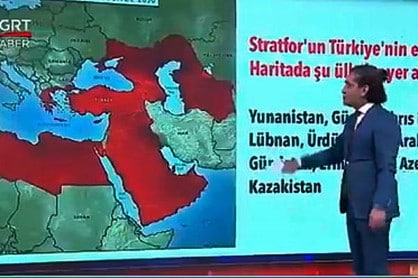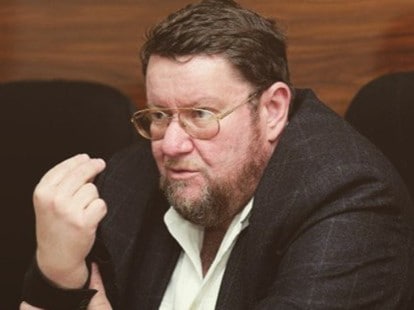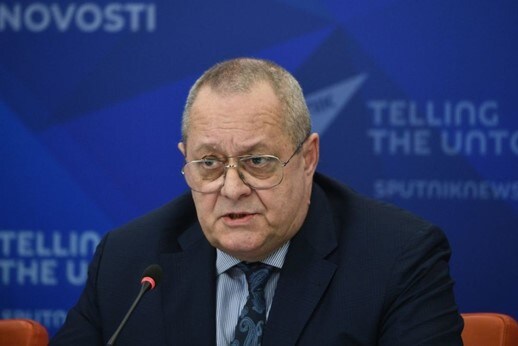A recent program on the state owned Turkish national channel TRT1, showed a map that included the territories that Turkey will annex in the next thirty years attracted attention in Russia. The lands in question included the southern Russian territories of These were the regions of Rostov, Volgograd, Astrakhan, Saratov, Samara oblasts, Chuvashia, Chechnya, Dagestan, Adygea, North Ossetia, and Crimea, Sevastopol. [1]
As Russia has invested a great deal in its relations with Turkey, the fact that Turkey coveted areas currently controlled by Russia, was embarrassing. Russian officials and pro-regime experts elected to sidestep the issue by arguing essentially that it was foolish to get excited over a threat that had no chance of turning into a reality given the disparity between Turkish and Russian power. Another tactic was to claim that the station did not represent the policies of Turkish President Recep Erdogan, and TRT1 was following its own highly nationalist inclinations.
A report on Russian reactions to the map of an expanded Turkey follows below:

Map of an expanded Turkey is shown on TRT1 (Source: Trud.ru)
Senator Dzhabarov: Russia Will Not Rise To The Provocation
The basic reaction in the Duma was that the map should not be taken seriously, because Russia would never allow Turkey to annex Russian territories. Andrei Krasov, First Deputy Chairman of the State Duma Defense Committee, believes that the Turkish authorities are striving to restore the Ottoman Empire. Turkish aspirations aside, he doubted that Ankara would try to forcibly annex Russian territories. If they had such notions they were advised to study Russia's history
"If they want to test the strength of the Russian spirit and our weapons, let them try," warned Krasov.
Another State Duma deputy, Pavel Shperov, claimed that Turkey hoped to restore the sphere of influence it had three centuries ago and did not hide this ambition in regard to Crimea.
“But I don’t believe, that this is a serious topic for discussion.”[2]
Senator Vladimir Zhabarov dismissed the item as a provocation designed to test Russia's reaction. "It seems to me that such information is deliberately thrown in to see the reaction. But we won't react to it."[3]
SUPPORT OUR WORK

In Crimea that is slated to become Turkish according to the TRT1 map, officials claimed that the presentation was ludicrous. Yuri Gempel, chairman of the Crimean Parliament's Public Diplomacy and International Affairs Committee stated: "Everything looks most ridiculous and recalls something out of science fiction. One can but advise the Turkish side to abandon dreams of Russian territory, otherwise they could injure themselves due to such insatiable appetites."[4]
Political scientist and orientalist Yevgeny Satanovsky claimed that there was no reason to get excited or resentful as Turkey had never concealed its plans to expand the country’s territories. "This is a completely normal position for Turkey. People openly and honestly declare the nature of their plans and what kind of empire they will build." Additionally, territorial expansion was not always the result of military aggression. A country could purchase the lands or it could move in if the country currently ruling these territories would "fall apart."[5]

Yevgeny Satanovsky (Source: Mk.ru)
Foreign policy expert Fyodor Lukyanov noted that the Turkish story was based on a 10-year-old book by George Friedman, founder of the private intelligence company Stratfor. Lukyanov dismissed Friedman as "a commercial charlatan. Once he was successful, but it’s not the case now."[6]
Middle East Expert Chuprygin: TRT1 Was Acting On Its Own, Did Not Represent Erdogan
Andrei Chuprygin, a senior lecturer at the School of Oriental Studies at the Faculty of World Economy and International Affairs at the Higher School of Economics believed that the program should be viewed in the context of Turkish domestic politics rather than as a serious Turkish blueprint for the future. Additionally, it was necessary to separate Turkish policy from the anti-Russian wishful thinking that characterized Stratfor:
"This is not a Turkish idea. They showed a 'map' developed by Stratfor... For many years, Stratfor in the analytical materials, that it provided to the political establishment in Washington, (and, thus, for the review of the entire world community) has been quite aggressive towards Russia and the countries of the Middle East." True, Chuprygin conceded, Turkish President Recep Tayyip Erdogan "has been pursuing a rather active, if not aggressive, policy of strengthening Ankara’s influence in certain regions, which he and his political circle have considered vital for Turkey. These regions include, first of all: the eastern Mediterranean, Syria, northern, eastern and central Africa, etc." This however should not be construed as neo-Ottomanism, an attempt to reconstitute the Ottoman Empire but as a drive for further independence from the United States.
"Erdogan often uses propaganda rhetoric, apparently believing that it is attractive to some strata of Turkish population. But it is unlikely that his actual political plans point towards this direction. Rather, this is an attempt to turn Turkey into the most influential player in the Greater Middle East region. It is also an attempt to have Turkey conduct a more independent policy, that is a policy less dependent on the United States, etc."
If the map of an expanded Turkey did not represent Erdogan, then why did it appear on the main government channel? Chuprygin does not rule out the possibility that TRT1 was acting independently either because it believed mistakenly that this was the direction that Erdogan favored or possibly it wanted to create a climate that would force his hand.
"TRT 1 is a fairly nationalist TV channel. The overwhelming majority of programs have very strongly nationalist overtones. Even Erdogan himself doesn’t display such a level of nationalism. I would not be surprised if the broadcast of this program was prepared by TRT 1’s management, in order to provoke unexpected political decisions by the country’s leadership. This too is a most possible scenario." [7]

Andrei Chuprygin (Source: Oriental.hse.ru)
Aleksey Malashenko, chief of scientific research at the "Dialogue of Civilizations" Institute and a Middle East specialist explained that Turkey acts as a great power only in the so-called Turkic world, but its influence in Europe, Russia and Crimea is exaggerated. "And there are no foundations for expanding this influence."[8]




